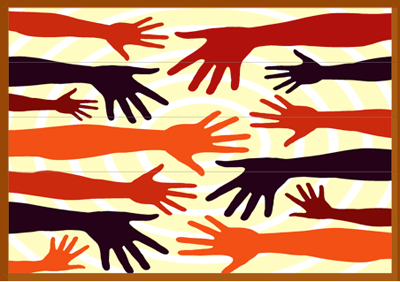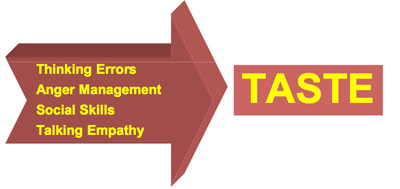T.A.S.T.E © PROGRAM
-
To download the TASTE brochure – click here
-
To download the TASTE assessment form – click here
-
To download the TASTE referral form – click here
TASTE is a psycho-educational program utilizing proven techniques to teach non-violent conflict resolution.
The curriculum consists of 4 essential segments:
Thinking Errors:
Thinking Errors are blockers to constructive communication. Some popular thinking errors include: excuse making, blaming, justifying, minimizing, and mind reading. These distortions are used while in conflict usually because persons feel the need to react defensively and in doing so make broad and negative generalizations about each other. These thoughts inadvertently transfer any responsibility away from the individual and onto others such as the legal system or other systems. Cognitive distortion, e.g. blaming others, blocks the ability to understand the needs and interests of others. Students learn about the adverse effects of these distortions, and how to identify their own thinking errors.
Anger Management:
Anger like conflict, can be utilized as an opportunity to develop better understanding about individual needs. Through an individual’s exploration about what triggers his/her anger, he can begin to acknowledge what needs are not being met. When angry, an individual can seize the opportunity to ask him/herself what basic need is inspiring the anger. For an example, a statement such as “Why didn’t you call?” The need could be one of trust. Anger always plays a role in aggression. Students are taught to identify their own underlying triggers and to develop coping strategies.
Social Skills:
Violence is a highly undesirable form of communication. Students are taught how to have authentic dialogue without resorting to violence. Social Skills can be enhanced to express individual needs. These skills can be facilitated through role-play, modeling and feedback while in conflict situations. Once these needs can be expressed, the skill to listening empathically can be developed.
Talking Empathy:
Empathy plays an essential role in successful conflict resolution. One’s ability to portray empathy can be blocked by a need to resolve, educate or story tell to others when they truly need only to be listened to with genuine compassion and interest. Practicing listening empathically makes open communication, clarification of misunderstandings and cooperative behavior possible.


TASTE Workshop Online Scheduling
We have a variety of different times and venues from which to choose.
You can use our real-time scheduling system to book and pre-pay the workshop of your choice now.
Don’t have a credit card? Call us at (631) 499-7869 and we can set up your class schedule for you!

